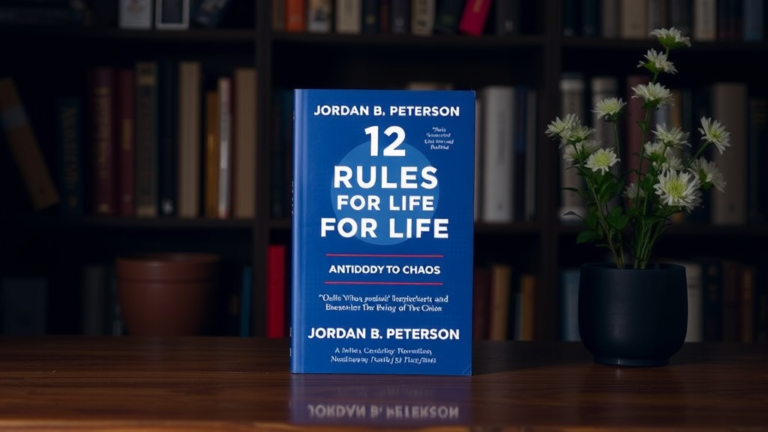Four Thousand Weeks by Oliver Burkeman – A Life-Changing Perspective
What would you do if you knew your life only amounted to around 4,000 weeks? In Four Thousand Weeks: Time Management for Mortals, Oliver Burkeman flips the script on productivity culture, reminding us that life’s brevity is an undeniable fact—and that’s exactly why it matters. Instead of chasing endless to-do lists or elusive control over time, this book challenges us to focus on what truly counts. With a mix of wit, wisdom, and brutal honesty, Burkeman offers a refreshing perspective on letting go, living intentionally, and making peace with the limits of our existence.
The Premise of Four Thousand Weeks
In Four Thousand Weeks: Time Management for Mortals, Oliver Burkeman asks us to confront a hard truth about the brevity of life. Rooted in the simple yet profound fact that the average lifespan totals around 4,000 weeks, the book challenges long-held assumptions about time management. Through a mix of philosophy, practical advice, and personal reflection, Burkeman encourages readers to rethink their approach to time, offering a roadmap for prioritizing meaning over mindless productivity.
Understanding the 4,000 Weeks Concept
The central premise of Four Thousand Weeks is startlingly simple: When you break an 80-year life into weeks, it amounts to only about 4,000. This stark number reframes how we think about time, forcing us to confront its limits. Burkeman doesn’t shy away from this reality; instead, he presents it as a powerful motivator for change.
But what does this mean for our decision-making? For starters, it’s easy to see how the weight of mortality can overwhelm us, yet Burkeman turns this around into an opportunity to prioritize what truly matters. Whether it’s relationships, meaningful work, or personal fulfillment, the finite nature of life demands that we learn to say “no” more often. Trying to do everything isn’t just unrealistic—it’s a recipe for perpetual dissatisfaction.
Instead of focusing on managing time to “fit it all in,” Four Thousand Weeks encourages readers to recognize their time is already scarce. This leads to deeper, more deliberate decision-making. Tasks like endlessly clearing our inbox or maximizing a packed calendar seem trivial when viewed through this lens. Why waste precious weeks on the wrong priorities? As Burkeman argues, the ultimate goal is not to get everything done, but to do the right things—ones that align with your values and leave you fulfilled.
For deeper insights into how Burkeman builds this argument, reviews like this one from The Guardian highlight the philosophical underpinnings of his ideas and how they resonate with modern readers.
Shifting from Productivity to Presence
In today’s culture, productivity is glorified. From endless apps to detailed to-do lists, we are bombarded with tools that promise to help us conquer every second of our day. Burkeman, however, flips the narrative. In Four Thousand Weeks, he critiques the obsession with doing more as not just ineffective, but deeply harmful. By constantly chasing productivity, we lose sight of what makes life meaningful.
One example Burkeman uses to illustrate this is the “efficiency trap.” He explains that the harder you work to improve your productivity, the more tasks seem to pile up, creating a cycle that’s impossible to escape. Think of it as trying to empty a bucket with a hole in the bottom—no matter how much effort you put in, it’s a futile endeavor. Does that sound familiar? It’s a condition most of us recognize, as work and obligations appear to never truly end.
The solution? Presence. Rather than striving to complete everything, Burkeman advocates for embracing life’s natural pace. He shares the idea of “strategic underachievement,” where you give yourself permission to intentionally neglect low-priority tasks. It’s not about failure; it’s about choosing where to succeed. Imagine making peace with unfinished work or incomplete projects—not because you gave up, but because they don’t align with what truly matters to you.
Burkeman also offers tangible advice for slowing down and living in the moment. He points to practices like savoring mundane activities, such as cooking or walking, as opportunities to reconnect with the present. When you focus on fully experiencing these moments, time becomes less about counting minutes and more about creating memories. For a modern take on how to put these concepts into practice, Sloww offers additional insights on incorporating Burkeman’s lessons into daily life.
By the end of this section, one thing becomes clear: life isn’t a race to accomplish more in less time. It’s about recognizing that time was never yours to control—it was always fleeting. Burkeman’s message isn’t to despair over this, but to embrace it as a reminder to live fully, and in the now.
Key Lessons and Philosophical Insights
Oliver Burkeman’s Four Thousand Weeks invites readers to rethink their relationship with time through actionable lessons and thought-provoking philosophy. Here, we’ll explore two transformative ideas from the book: Hofstadter’s Law and radical incrementalism. Both concepts are surprisingly simple yet profoundly impactful, offering pathways to a more intentional and fulfilling life.
Hofstadter’s Law and Accepting Delays
Have you ever started a project, confident it would only take a few hours, only to find yourself days—or even weeks—behind? This all-too-common experience is explained by Hofstadter’s Law, which states, “It always takes longer than you expect, even when you take into account Hofstadter’s Law.” Originally coined by Douglas Hofstadter, this principle is a reminder that underestimating the time it takes to accomplish a task is almost inevitable.
Burkeman suggests that embracing the reality of delays doesn’t mean succumbing to chaos or poor planning—it’s about designing your life with room to breathe. For example, instead of assuming you can knock out a big work project or home renovation “in a weekend,” allow twice as much time as your gut instinct tells you. This added cushion can save you from stress and frustration when things inevitably don’t go as planned.
Here are some practical takeaways to manage Hofstadter’s Law in everyday life:
- Pad your schedule. If you think a meeting will take an hour, block 90 minutes just in case.
- Prioritize the essential. Identify your “must-do tasks” and leave some low-priority items undone—as Burkeman points out, not everything truly matters.
- Embrace realistic deadlines. Avoid overly optimistic timelines that set you up for failure. Instead, break large projects into smaller, more manageable tasks.
Hofstadter’s Law reminds us that life rarely follows a strict timeline and that’s okay. By shifting your mindset to expect delays, you’ll reduce self-imposed pressure and increase your capacity to adapt.
For a deeper understanding of this principle, check out Hofstadter’s Law Explained to discover its origins and practical applications.
Radical Incrementalism: Small Steps to Big Changes
In a world that often glorifies overnight success, Burkeman serves up a refreshing truth: the most meaningful progress comes from small, consistent efforts. Radical incrementalism flips the script on perfectionism and grandiose goals by showing how steady, thoughtful actions add up to transformative results over time.
Think about it this way: if you want to learn a new language, starting with 10 minutes of practice each day can eventually lead to fluency. The idea is not to overwhelm yourself with lofty expectations but to commit to manageable, meaningful routines. This philosophy can be applied to nearly any area of life—from building a career or improving your health to nurturing relationships.
Here’s how radical incrementalism can make a real difference:
- Start small. Don’t aim to meditate for an hour if you’ve never meditated before. Try 5 minutes and gradually build from there.
- Celebrate consistency. Burkeman highlights that the key to success lies in showing up regularly, not necessarily perfectly.
- Let go of instant gratification. Small actions might not feel groundbreaking at the moment, but over time, they create a powerful ripple effect.
This approach also helps combat the stress tied to all-or-nothing mindsets. When you focus on incremental progress, you give yourself permission to succeed slowly and sustainably rather than burning out with unrealistic expectations.
For further insights into radical incrementalism, you can explore this article on starting small for big projects, which explains how small steps can lead to lasting outcomes.
Both Hofstadter’s Law and radical incrementalism are reminders that life isn’t a sprint to achieve as much as possible. Instead, it’s about making meaningful choices and appreciating gradual, intentional progress. Recognizing and applying these principles can transform how you approach time and priorities.
Critiques and Limitations of Burkeman’s Approach
While Four Thousand Weeks offers a refreshing alternative to traditional time management philosophies, it isn’t without its critiques and limitations. Burkeman’s deeply philosophical approach, while compelling, doesn’t always land with all readers. Some find its abstract tone and lack of immediate practical applications challenging to navigate. Below, we’ll explore some common criticisms of the book and where it might leave readers wanting more.
Overly Philosophical at Times
One frequent critique of the book is its heavy reliance on philosophical concepts that can feel removed from everyday life. While Burkeman eloquently discusses the finite nature of time and existential realities, some might argue that his musings don’t always translate into actionable advice. Readers hoping for a guide brimming with straightforward strategies may find themselves discouraged by its more abstract passages.
For instance, the idea of embracing mortality as a way to prioritize better might feel profound, but it leaves some readers questioning how to apply this in their busy, chaotic lives. Not everyone can simply pause and reframe their perspective when daily obligations loom large. As The New York Times review points out, the book is less about solving problems and more about learning to live with them—a perspective that may not provide the clarity or solutions every reader seeks.
Repetition of Core Ideas
Another common criticism leveled against Four Thousand Weeks is its tendency to reiterate the same themes throughout the book. The core message—that life is short, priorities matter, and it’s impossible to “do it all”—is undeniably powerful. However, some readers might feel this theme is stretched thin across multiple chapters without significant new insights being added.
For those who grasp the book’s central premise early on, the remaining sections may feel repetitive. According to one reviewer on Schuetzler.net, while Burkeman’s arguments are thought-provoking, they occasionally lack variety, making parts of the book feel longer than necessary.
Missing Practical Tools for Change
Though Burkeman’s critique of productivity culture and advocacy for embracing limitation are liberating, the book doesn’t always equip readers with tangible tools for immediate change. Those entrenched in workaholic or hyper-organized habits might feel unsure of how to break free. For instance, Burkeman promotes ideas like “strategic underachievement” and focusing on meaningful priorities, but some practical examples of how to implement these ideas into daily routines are sparse.
This absence of detailed how-to guidance may leave readers seeking more concrete frameworks to complement Burkeman’s philosophical insight. As noted in this review, some might wish for clearer steps to embrace this mindset—a roadmap to balance philosophy with daily pragmatism.
Subjectivity of Values
Burkeman’s emphasis on choosing what truly matters in life invites deep self-reflection, but it can also feel daunting for those still figuring out their values. Not everyone has clarity on what constitutes as meaningful to them, and the book doesn’t provide much scaffolding for readers struggling with this. It assumes a level of self-awareness that not all of its audience may possess, potentially leaving space for confusion or inertia.
For people wrestling with identifying their priorities, a more guided approach could have helped prevent overwhelm. However, as noted by From the Green Notebook, the book feels more tailored to readers familiar with abstract thinking and open to existential inquiry—traits that aren’t universal.
Universal Message, Limited Individualization
Lastly, while Four Thousand Weeks discusses a universally shared constraint—time—it sometimes fails to address how different life circumstances shape our relationship with it. For example, the struggles of a single parent juggling endless responsibilities may differ vastly from those of a retiree or a college student. Burkeman’s approach, while empathetic, doesn’t always acknowledge or tailor itself to these varied realities.
The book’s broad, one-size-fits-all message can feel disconnected from the unique pressures and priorities of diverse readers. This sentiment is echoed in some forums like Reddit, where individuals have shared how certain topics felt out of touch with their lived experiences.
In sum, Four Thousand Weeks succeeds in shifting the narrative around time and productivity but has its limitations. For readers seeking immediate strategies or more adaptive, individualized advice, these gaps may leave them less satisfied.
Final Thoughts: Why This Book Matters Now
In a world that often feels like it’s moving too fast, Four Thousand Weeks lands as a crucial reminder to step back and reassess how we spend our most precious resource—time. Oliver Burkeman doesn’t just call out the pitfalls of our productivity-obsessed culture; he offers a radical yet liberating shift in perspective: life isn’t about squeezing more into every moment, but about aligning your limited moments with what truly matters. Why is this simple concept so transformative right now? Because we’re more inundated than ever with demands for our time and attention, making Burkeman’s insights feel not only relevant but urgent.
A Defining Book for the Age of Burnout
Technological advancements have made it easier than ever to work faster and harder, but they’ve also blurred the boundaries between our personal and professional lives. Many feel trapped in an endless cycle of notifications, commitments, and unmet expectations. This phenomenon—what some have called the “age of burnout”—is the perfect backdrop for Burkeman’s message. He challenges readers to reject the myth that they can “do it all” and instead focus on doing the right things.
For readers navigating this culture of overwork, concepts like “strategic underachievement” and embracing the imperfection of unfinished to-do lists feel like a breath of fresh air. It’s a reminder that time cannot and should not be controlled—a truth that resonates deeply in today’s context of endless apps, insatiable productivity hacks, and societal pressure to optimize every waking moment. As discussed in this review, the book’s relevance lies in how it purposefully disrupts conventional wisdom, offering clarity in an otherwise overwhelming era.
Practical Wisdom for Complex Times
Four Thousand Weeks doesn’t promise a magical solution, but that’s where its power lies. It acknowledges the chaos of modern life and offers realistic, grounded advice for coping with it. Burkeman doesn’t shy away from highlighting that life is imperfect and limited, but he offers tools like radical incrementalism—taking small, deliberate steps—as a way to regain focus. This is a deeply practical approach for today’s readers, where long-term thinking is often sacrificed to fleeting tasks and quick wins.
Additionally, the book introduces the importance of intentional leisure—activities that are not aimed at productivity but are instead about genuine presence. Whether that’s a slow walk in the park, a cup of coffee outside, or reading this very book, Burkeman urges readers to reclaim these moments. For more insights into applying these principles, this summary from readers on Reddit captures diverse perspectives on how readers have incorporated these shifts into their lives.
Why It Matters More Than Ever
The most profound takeaway here isn’t just about managing time; it’s about reshaping our worldview. Right now, people are waking up to the idea that constant busyness robs them of joy, purpose, and connection. The beauty of Burkeman’s writing lies not in its complexity but in its ability to resonate on such a human level. Why are we rushing through moments that so clearly make life worth living? Are we so caught up in “what’s next” that we neglect what’s now?
Burkeman’s ideas counter a modern culture addicted to the hustle, offering an alternative that’s built on slowing down, prioritizing relationships, and recognizing that some tasks are better left undone. As captured perfectly in this review, it’s not just a book you read—it’s a mindset you adopt. For so many grappling with the pressures of modern life, Burkeman essentially holds a mirror up, showing us a better way to live.
Let’s face it: the message of Four Thousand Weeks couldn’t have come at a more critical time. It speaks to the heart of what it means to live meaningfully in an age where attention is a commodity and priorities often feel impossible to balance. While the book may not offer a step-by-step guide, its enduring impact lies in its challenge to embrace life’s constraints as a gateway to freedom and joy. The real question is whether or not we’re ready to take that challenge seriously.
For those who are, the insights of Four Thousand Weeks don’t just change how you manage your time—they change how you see your life.
Conclusion
Four Thousand Weeks by Oliver Burkeman reshapes how we think about time, not as a resource to conquer but as something to honor. It delivers a transformative message: life’s brevity is not a limitation but an opportunity to focus on what truly matters. In a world driven by endless tasks and constant demands, Burkeman’s insights help anchor us in the present, urging us to choose meaning over busyness.
This book isn’t a manual for squeezing more into your days—it’s a call to embrace life’s constraints and find fulfillment within them. Whether you’re a student, a professional, or retired, its lessons resonate with anyone feeling the weight of time slipping through their hands. It challenges us to stop striving for perfection and instead focus on the experiences, people, and values that define a life well-lived.
If you’ve ever wondered how to make better use of your fleeting weeks, this book offers a perspective that’s both sobering and liberating. Now is the time to ask yourself: are you spending your life on what truly matters? Pick up Four Thousand Weeks—it might just change the way you see the time you have left.







